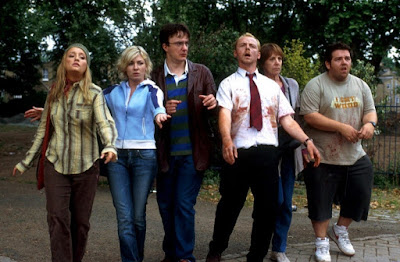 |
| Image from Shaun of the Dead, (c) probably Universal Pictures 2004 |
Familiarity breeds contempt, it is said, and certainly one of the first things to be called at the screen during any zombie feature is usually 'aim for the head, numbnuts!' We the viewers are so steeped in this lore that genre blindness and obedience to years of best-practice training which teaches shooters to aim for centre of mass looks like sheer folly. They're zombies, right? They move slowly and eat brains. Shoot them in the head. Job done. Not only does this create animosity towards the characters in a work of fiction, it is also part and parcel of a process by which an antagonist loses their sense of threat.
This was the oft-maligned genius of 28 Days Later. Say what you like about the rage monkeys and all, the film's trump card was the fast zombie. We were keyed up to expect zombies and when they came barreling along at a rate of knots, we were totally unprepared. Since then, the fast zombie has lost that shock power and it occupies a similar place to the slow zombie. By the same token, I guess Stephanie Meyer deserves some credit for bucking expectations of the term 'vampire', but I really struggle to give it, and I know exactly why. 28 Days Later gave us fast moving monsters that nonetheless filled the same horror role as slow zombies, of being mindless, hunger-driven beasts that look like us, but aren't. Meyer's vampires have next to nothing of horror left in them, just melancholy and glitter.
But I digress.
 |
| It is desperately important to some people that Stormfly is not a dragon. Astrid doesn't seem bothered. Image (c) Dreamworks, 2014 |
But this isn't my media blog, it's my writing blog, so what does this mean for writers? Well, basically it means that what you choose to call something is a major decision, especially if you're leaning towards one of the popular terms. If you call something a zombie, you're loading it with expectations. If you call something a dragon you'd better be prepared for people to count the feet and sniff disdainfully (although this one is less of a big deal.) If you call something a witch, be ready for potential Wiccan backlash(2), and if you call a race of travelers you-know-what... Well, you deserve whatever's coming to you, really. So, before you decide on a name you should:
a) Make sure it's not a racial, ethnic or cultural slur, especially if you're white(3).
b) Be aware of the intrinsic cultural coding and whether it fits with what you're writing.
c) Decide if you're happy to follow expectations, or if you want to subvert them.
Point c is important. There's nothing wrong with breaking expectations if you're doing it as a subversion (as with the original fast zombies or the vampires of the Dresden Files, none of which exactly work like trad vamps and that's the point,) but if you're trying to shoehorn something else into a conventional term, you're making a rod for your own back.
From the other side, if you are going with that conventional term, be sure that if you have changes, there are reasons for them, either relating to the narrative or 'in-universe.' Fast zombies result less from mutation of the zombie virus than from a desire to shake up the genre, but faeries who are vulnerable to silver and not iron or vampires who aren't burned in the sun should probably have a reason for that and the question ought to be addressed.
 |
| Aurochs? Load of bull if you ask me. Image by Heinrich Harder. |
(1) Not that there isn't an element of appropriation in zombies, but that ship sailed a long time ago and is, if anything, a lost irony to those who argue the toss on zombie speed.
(2) Dating a Wiccan has seriously sensitised me to this; it's easy to be a jerk just by not thinking.
(3) See (2) above.